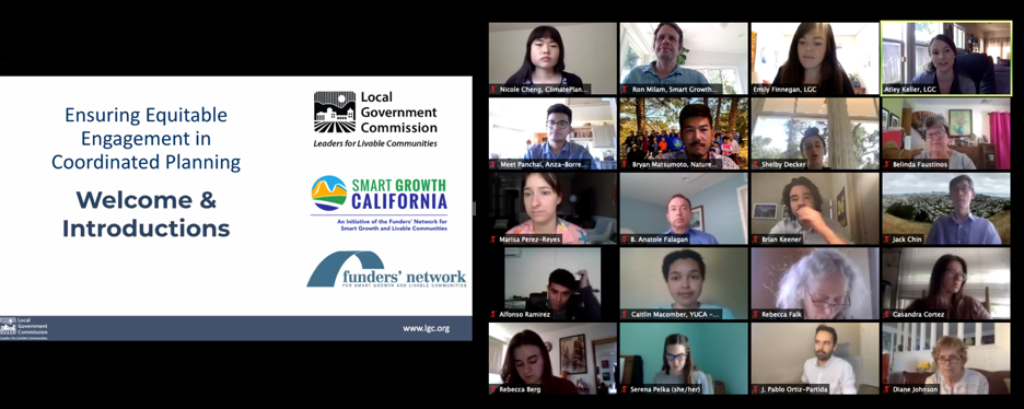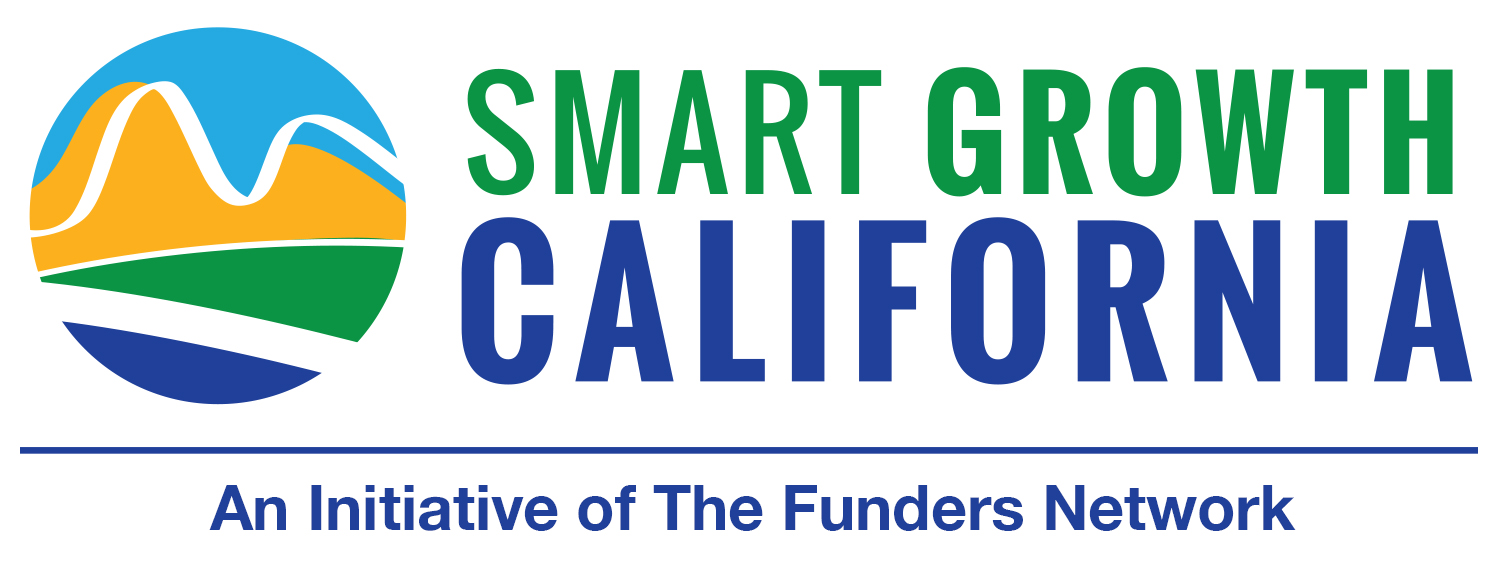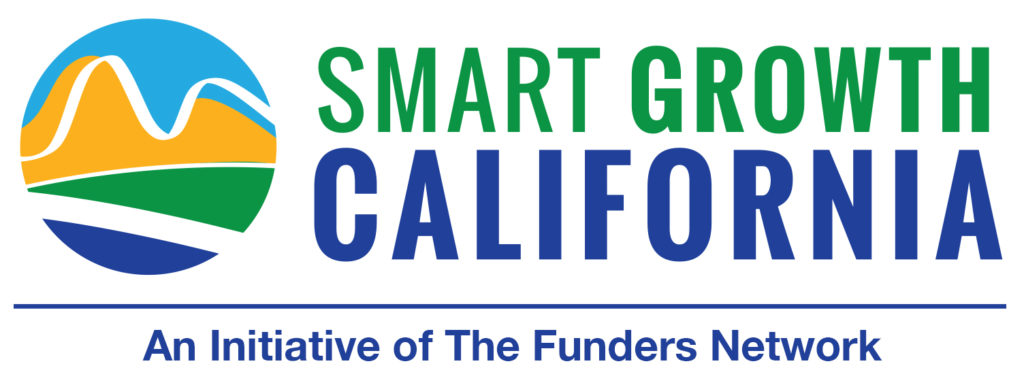On July 9th, 2020, 121 participants joined Local Government Commission (LGC) and Smart Growth California’s virtual policy briefing covering the role that public engagement plays to advance equitable and sustainable water management solutions throughout California. The briefing, spearheaded by five regional nonprofits and their partnering community foundations that participate in Smart Growth California’s Community Foundation Water Initiative (CFWI), was the result of a year of coordinated work that generated the creation of five action plans, story maps, and Guiding Principles for Equitable Engagement in Coordinated Planning.

The five nonprofits and their partnering community foundations are: ClimatePlan and San Francisco Foundation; Youth United for Community Action and Silicon Valley Community Foundation; Nature for All and California Community Foundation (Los Angeles); Fresnoland and Central Valley Community Foundation; and Anza Borrego Foundation and The San Diego Foundation.
The policy briefing unpacked each region’s unique gaps for equitable coordinated planning, with a particular emphasis on engaging communities of color. These diverse – and yet in many ways similar – perspectives set the foundation for the development of eight draft Guiding Principles for Equitable Engagement in Coordinated Planning, which address challenges including top down planning approaches, structural racism, inaccessible community engagement, and community members being stretched too thin. The principles challenge decision-makers to tailor their policy frameworks by focusing on building local community capacity, and providing resources necessary to support marginalized communities so they can actively participate. LGC is welcoming feedback and finalizing the guiding principles in September.

Action Plan Summaries
Each nonprofit’s work over the last year has been informed by LGC’s 2019 Equitable Integration of Water and Land Use report. Drawing from the report, partners developed and are now working to implement their own regional action plans. Each of the nonprofit’s action plans outline how they’ll address their region’s unique challenges, and advance equitable engagement in water and land use decision-making.
ClimatePlan (Bay Area)
ClimatePlan’s efforts describe how they developed overarching principles and recommendations to support the Association of Bay Area Governments and the Metropolitan Transportation Commission in their efforts to integrate water into two of their land-use planning processes; the Regional Housing Needs Allocation (RHNA) and Regional Transportation Plan. For RHNA, ClimatePlan recommends that MPOs work with HCD, equity advocates, water agencies, and other stakeholders to develop guidelines for housing allocation numbers in the case water supply is severely limited. For the regional transportation document, they recommend MTC prioritize growth in high resource and high transit areas, and should not fund projects that are threatened by sea level rise, lead to displacement of low-income households, convert open space and agricultural resources to urban uses. Based on their research, ClimatePlan released a report on water and land use integration in the Bay Area.
Youth United for Community Action (East Palo Alto)
Youth United for Community Action’s (YUCA) plan outlines how to help lay a strong foundation for local and sub-regional climate change planning efforts and ensure those processes include the integration of water and land use. Their approach is rooted in social justice principles, effective cross-sectional collaboration, local leadership development, and building political will at the County level. YUCA’s approach is broadly encompassing because currently, the organization is formally committed to two parallel projects that are interrelated: 1) the Climate Ready San Mateo County Collaborative and 2) a community-based pilot project in East Palo Alto.
Nature for All (Los Angeles)
Nature for All’s focus is to prioritize immediate analysis and advocacy to influence current water projects in the pipeline, and close gaps in the regional decision-making process going forward to ensure transparency, equity and fulfillment of the intent of the Safe Clean Water Program, and the will of the voters to integrate nature-based, multi-benefit water investments into disadvantaged communities through comprehensive planning. This action is in response to their region’s immediate needs and the timeline of Los Angeles County’s Safe Clean Water Program, which may fast-track millions of dollars of Measure W infrastructure investments in its first round. Still in its infancy with scoring rubrics needing tighter definition and awarding of projects vulnerable to subjective, inequitable distribution and with little community oversight, they are playing a critical role holding the line on accountability to disadvantaged communities (DACs), community engagement and ensuring real community benefits of potential projects.
Anza Borrego Foundation (Borrego Springs)
Anza Borrego Foundation’s plan describes how they will lead a community planning process focusing on integrating land and water use, economic vitality, and environmental health in Borrego Springs. The Borrego Valley Stewardship Council (BVSC) was launched and is now the recognized forum for community-wide discussions of topics which are of concern to all of Borrego Springs. Participants include residents, organizations, businesses, and Anza Borrego State Park. The community planning process will result in an understanding of the needs of the community and its organizations, development of a community vision, and ultimately the empowerment of a small, unincorporated community to have efficient and clear goals for an integrated community plan. The Stewardship Council Action Plan provides the framework for reaching the Council’s goals.
How did we get to this moment?
Leading up to CFWI’s partnership with Local Government Commission and their NGO partners, the initiative launched in 2015 with the support from the S.D. Bechtel, Jr. Foundation. Since then, the cohort of five participating community foundations have worked individually and collectively to explore ways in which to integrate water related issues into their existing grant portfolios and advance sustainable water management in California. In 2017, CFWI engaged Smart Growth California to facilitate their efforts to identify and implement high value collective activity.
In 2018 CFWI and Smart Growth California partnered with LGC to develop Equitable Integration of Water and Land Use, a report released in 2019, which provides an overview of both statewide and regional challenges and opportunities throughout California. It also offers recommendations for state and local municipalities as well as community foundations, advocates and other stakeholders. See this 2020 Inside Philanthropy article on CFWI’s impact.
To advance the regional and statewide recommendations outlined in the report, each foundation from CFWI partnered with a local nonprofit within their region. Three of the nonprofits collaborated with the CivicSpark Fellows program, which builds leadership amongst emerging sustainability professionals, to develop and move their action plans forward.
The July 2020 policy briefing concluded with the progress and project outcomes within each of the five regions.
Moving forward, The Funders Network and Smart Growth California, with support of S.D. Bechtel, Jr. Foundation, are planning to create a report summarizing the collaborative CFWI effort and impact of the initiative.

